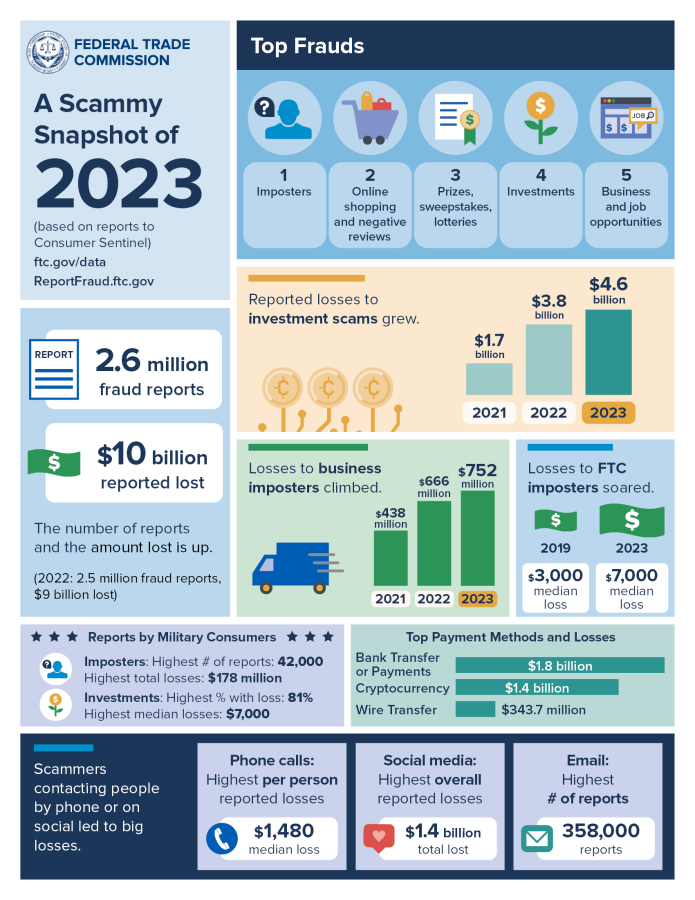

Consumers are increasingly falling victim to sophisticated investment scams, with cryptocurrency at the forefront of these deceptive schemes. Reports from the FBI, Federal Trade Commission (FTC), and California Department of Financial Protection and Innovation underscore the alarming surge in investment scams, prompting more resources and education available to protect consumers. Investment scams include pyramid schemes, securities fraud, or advance scams that charge upfront fees to invest.
We are all familiar with the warning signs of scams, such as pyramid schemes or requests from individuals claiming to be Nigerian royalty needing help with a large inheritance. In the past, these were commonly referred to as "con-men," where the scammer gains your trust and takes off with your money. However, modern scams can be more difficult to detect. Investment scams, in particular, have become a significant issue, leading the FBI, Federal Trade Commission (FTC), and Better Business Bureau (BBB) to release reports on the alarming rise in reported investment scams by consumers in 2023.
While each organization categorizes investment scams slightly differently, both the FTC and FBI have identified investment scams as the most commonly reported type of scam, with many reports involving cryptocurrency. Locally, the California Department of Financial Protection and Innovation has taken action by establishing a cryptocurrency unit and providing resources for victims to report investment scams. For helpful tips and a list of common scams, visit https://dfpi.ca.gov/investment-scams-what-consumers-need-to-know/. Other resources include a detailed list of tips and an overview of investment scams and the forms they take and a Crypto Scam Tracker, which provides information on the latest scams based on consumer complaints.
Nationally, the FTC reported on the prevalence of investment scams, reporting that consumers lost $4.6 billion to investment fraud in 2023 alone, making it the most financially damaging form of fraud reported. Likewise, the FBI reported losses from investment scams in 2023 as the highest of any crime type tracked by the IC3, rising to a staggering $4.57 billion in 2023, a 38% increase over 20221. Investment scam reports referencing cryptocurrency rose 53% to $3.96 billion in 2023. (Source: https://www.ic3.gov/Media/PDF/AnnualReport/2023_IC3Report.pdf) Scammers are even masquerading as crypto recovery firms, preying on victims desperate to recoup their investments. These impostors often communicate via social media platforms or within the comment sections of online news articles and may resort to impersonating law enforcement to legitimize their claims.
Scams involving precious metals, particularly through self-directed Individual Retirement Accounts, are also on the rise. The Financial Industry Regulatory Authority (FINRA) has issued warnings about fraudulent schemes offering investment-grade coins with inflated future values tied to speculative events, ultimately leaving investors with substantial losses.
In the face of evolving threats, education and awareness about tactics employed by scammers is paramount. Resources, such as FINRA's online quizzes and interactive games, provide valuable insights into recognizing and avoiding investment scams. FINRA regularly provides information regarding red flags for investment scams. Here are a few the agency emphasizes:
Investors are urged to verify the legitimacy of sellers and to avoid sharing personal or financial information with unfamiliar entities. Call 1-800-732-0330 to search for a seller or visit www.investor.gov to search for license and registration information, as well as employment history and other important disclosures.

Happening At Home
While these statistics represent what is happening at the state and national level, the reality is also happening close to home.
In August 2023 a new prospect opened an account funded with approximately $25,000 in wires originated by two different individuals from Canada and New York. Within only a few weeks, she deposited a $368,000 check from the United States Treasury, which the bank team verified by contacting the Treasury. The following day, the client made the first of several withdrawals, explaining that she bought and sold cryptocurrency for friends, which prompted ARB’s risk team to contact an IRS investigator.
The ARB team quickly connected the dots between the client and the sender of the Canadian wire discovering online communication about a romance scam, the promise of big returns on a cryptocurrency investment, and an opportunity to work with a crypto recovery firm.
By leveraging the Bank’s local and federal connections, the Bank initiated a meeting between the client and law enforcement where she ultimately revealed a 2-year long romance that she did not realize was a scam. The client was unknowingly acting as a money mule, cashing checks and withdrawing cash from different banks and depositing it for her online friend at bitcoin ATMs in town.
At American Riviera Bank, proactive measures and collaborative efforts with law enforcement have led to swift resolutions in combating financial crimes. If you’ve been a victim, prompt reporting is crucial. Reports should be filed with law enforcement agencies like the FBI at www.ic3.gov and the FTC at ftc.gov. By staying informed and working with local bankers you know and trust, consumers can safeguard their financial well-being and thwart the efforts of fraudsters.